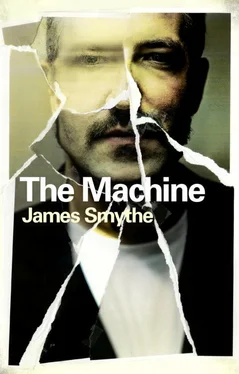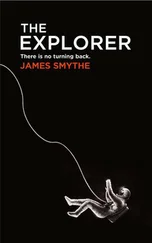Come on, she says. We should eat. I’ve made lunch. She helps him to a sitting position, and his head lolls, and he moans. I know it hurts, she says, but it’ll get better. She moves his feet out of the bed and tells him to stand up, and he shuffles forward. Then he puts his feet onto the floor itself, and tests his toes. I’ll help you, she says. She tries to take his weight, but he shifts so much of it back to himself, more than he has before during this process. He treads gently, toe to heel, like a series of pictures of somebody walking, rather than somebody actually doing it. He stumbles, and the weight on his ankles isn’t there. He shakes. Okay, Beth says.
Toilet, he says. So they go there first, and she helps him sit down. He pisses and shits, and then cries when she has to help him clean himself afterwards. He hardly speaks, not really, he doesn’t say that he’s ashamed that she’s doing this, but she can tell. It’s something ingrained and deep inside him. Shame and self-pity and self-hatred and a humiliating desire to do this himself. He knows that there’s something wrong. She wipes him and he rests his face on her arm, her chest, and shoulder, and he sobs. Beth doesn’t mention it afterwards, taking him to the table and sitting him down. There’s an omelette in front of him, softly fried, more scrambled egg than solid.
Can you manage it? Beth asks. He shakes his head, so she feeds him first. He opens his mouth and she slides the egg into it, onto his tongue. He swallows of his own accord. He cries as she feeds him, and tries to manage words.
My head, he says.
I know, she says. Finish lunch. You still remember who I am?
Beth, he tells her.
Okay, she says. You’ll be okay, I promise. Do you know what we’re doing here?
I don’t know, I don’t know. He still resists eye contact. She puts the egg into his mouth: the diazepam she’s crushed up buried somewhere in the butter and cheese that binds the thing together. He swallows and then refuses the next mouthful – turns his head – so Beth tells him that he has to have a drink to wash it all down. He takes it.
She helps him back to the bed before he starts to get drowsier. His increased responsiveness is certainly making this easier, and with each step he takes it feels like he’s taking more and more of his weight. He lies down of his own accord, and he shuts his eyes and smacks his lips.
Do you know what that noise is? Beth asks him. She’s referring to the Machine.
I don’t know, he says through the fug.
It’s okay. Don’t worry. She takes down the Crown and presses the screen.
Laura hammers on the door with the balls of her fists.
This is wrong, she shouts. Beth, you have to listen to me! The neighbours have come out of their flats to watch, because they assume it’s a domestic – and that’s one of the pleasures, for them, of this block’s forecourt, the sheer number of arguments that spill out of the flats and onto the concrete, complete with whatever’s thrown out after the offending party, and usually a crying brood, begging for whichever parent has the greater potential for violence to calm down. They stay standing as Laura continues her tirade. What you’re doing is wrong, Beth. What you’re doing is against everything that we are!
Beth sits on a chair at the dining table as Vic rests. She watches the shadows of Laura’s fists raise and fall on the glass.
Beth, answer the door. Answer the door.
Or what? Beth asks. She doesn’t shout it, but she knows that Laura will hear.
Or I’ll tell people what you’re doing.
It’s not illegal to stay inside your flat. This is a game in which neither of them is going to say it first: Laura in accusing Beth of something that’s barely common knowledge, something that barely exists as a possiblity; and Beth won’t admit any more than she already has. And Vic isn’t here against his will. He was checked out of the clinic, taken by his wife for the summer, a break from the monotony of his care, and he won’t be returned because he’s being changed.
You know what I’m saying, Beth. She hushes her voice to a spat whisper. Let me in and we can talk about this.
This isn’t your business, Beth says. She drinks water and rubs her head where it’s sore – she’s so tired still, and when she closes her eyes all she can see is the Machine, that wave of ever-deep black metal – and takes more ibuprofen. She counts her pills: half the diazepam gone, half the ibuprofen. She’s been using more of them than she anticipated. She’ll have to do another run: late at night, she thinks, when there won’t be people outside, when she can rely on Vic to stay asleep. He’s excellent at that. Sleeping through the night, never waking, never making a peep. That’s something he was good at before he went to war, being able to drop off anywhere, any time. Cars, trains, the hard benches of an airport: he could sleep on them.
You need help, Laura says.
I can handle him.
Beth, you need friends and you need help to see you through times like this.
I’m sorry, Laura.
I don’t know what you’re doing in there, Beth. I don’t know what you think you’re doing, but it’s not your husband inside there—
Stop it.
—because he was destroyed, and he cannot now be reconstructed, not from nothing. That isn’t your right. She pauses. Genesis 2:7: the Lord God formed the man of dust from the ground, and he breathed life into the man’s nostrils; and the man became alive.
You seemed so normal when we first met. Beth says it to hurt her, and there’s silence for a while, as the slump comes: Laura’s clothes dragging themselves down the door.
I’m not leaving, Laura says. I can help save you, don’t you see?
There’s nothing to save, Beth says. She shuts the door to the Machine’s room again and puts the Crown on Vic’s head. She presses play, and Vic’s voice emerges: so instantly reassuring.
I’m having trouble remembering things, he says.
That’s natural, the doctor says. You had a nasty accident.
Yes. That’s what I’m told.
You don’t remember?
No.
The recording is from after it was all settled: after the majority of the work had been done. From here, they told Beth, it was just cleaning up. From this point onwards, anybody could talk him through it.
And then shouting, coming through the flat.
What’s that voice? Beth, who’s in there with you? Laura beats the front door again, and Beth remembers that the playback is still at full volume, so that she could hear it over the Machine. She wonders why Laura hasn’t heard the Machine itself: supposes that she’s assumed it to be a normal household appliance. She wonders if the neighbours have noticed the vibrations coming through their floors or their ceilings. If the shudders carry through the foundations and supports and make their light fixtures rattle and their carpets hum. Beth, I can hear voices, who’s in there?
Beth opens the door. The voices fill out into the rest of the flat.
I remember being somewhere. The desert? Is that where I had the crash?
What crash is that?
The, ah, the car crash. That’s why I’m here. Speaking to you.
Who are those voices, Beth? Laura sounds desperate. And then Beth unlocks the front door and opens it. The sunlight from outside is brighter than she thought: it’s been a few days – how many? – since she left the flat. Laura’s there, fingering her necklace. Oh my Lord, you’re seeing sense. You’re seeing sense. Beth looks around. Fat neighbour is there, pretending to be hanging out washing across the balcony rail (which they’re banned from doing). The kids stare. Across the way, some of the other families stand on their balconies and watch, because Laura’s voice is shrill and loose and echoes across the courtyard. Below them, a group of youths in the courtyard, standing on the benches and the flower-beds, look up at Beth and Laura. The boy is there: the one with the scar and the bike and the naked leaps into water that he can’t judge the depth of; and he spits onto the floor and stares, and doesn’t stop staring at Beth as she scans the complex.
Читать дальше
Конец ознакомительного отрывка
Купить книгу










